 Petzlover
Petzlover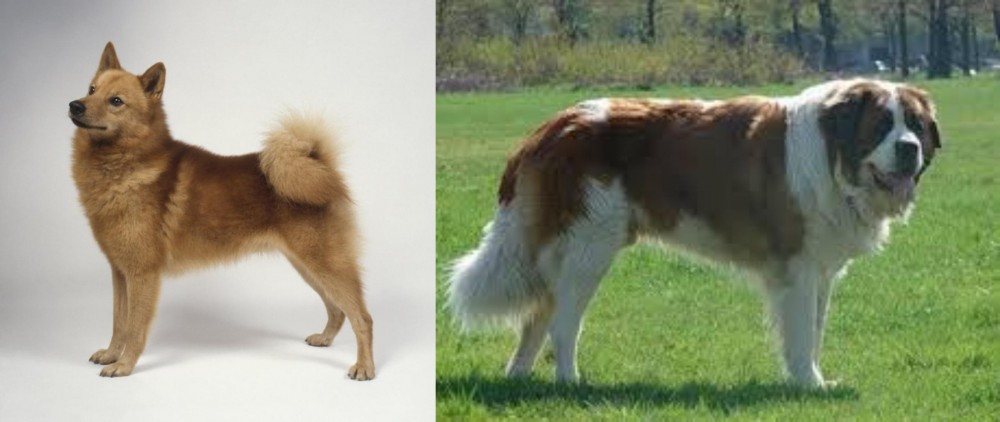 Finnish Spitz is originated from Finland but Moscow Watchdog is originated from Russia. Finnish Spitz may grow 19 cm / 7 inches shorter than Moscow Watchdog. Finnish Spitz may weigh 53 kg / 116 pounds lesser than Moscow Watchdog. Both Finnish Spitz and Moscow Watchdog has same life span. Finnish Spitz may have less litter size than Moscow Watchdog. Both Finnish Spitz and Moscow Watchdog requires Moderate Maintenance.
Finnish Spitz is originated from Finland but Moscow Watchdog is originated from Russia. Finnish Spitz may grow 19 cm / 7 inches shorter than Moscow Watchdog. Finnish Spitz may weigh 53 kg / 116 pounds lesser than Moscow Watchdog. Both Finnish Spitz and Moscow Watchdog has same life span. Finnish Spitz may have less litter size than Moscow Watchdog. Both Finnish Spitz and Moscow Watchdog requires Moderate Maintenance.
 The “barking Bird Dog” or Finnish Spitz was Developed in Finland. The breed is fearless and small with a different style than many other hunting dogs. He style of tracking is unusual and he indicated his quarry by barking. He was bred to hunt all sizes of prey from as large as bears to as small as squirrels. He was called the “Barking Bird Dig” because he pointed at the prey by barking and giving the hunter knowledge of the prey and an easy approach to it. In Finland, the Spitz is still a hunting dog. In 1979 The Finnish Spitz became the national dog of Finland.
The “barking Bird Dog” or Finnish Spitz was Developed in Finland. The breed is fearless and small with a different style than many other hunting dogs. He style of tracking is unusual and he indicated his quarry by barking. He was bred to hunt all sizes of prey from as large as bears to as small as squirrels. He was called the “Barking Bird Dig” because he pointed at the prey by barking and giving the hunter knowledge of the prey and an easy approach to it. In Finland, the Spitz is still a hunting dog. In 1979 The Finnish Spitz became the national dog of Finland.
Spitz-like dogs have been present in Finland for over 8000 years. It is believed that dogs living in higher latitudes had more in common with the Taymyr Wolf od North Asia than with the gray wolf. Tests indicate that the chance of the Spitz being related to the Taymyr is between 1.4&a and 27.3%. The Taymyr is extinct today. This shows that the present day dog descends from more than one type of wolf and more than one area. The Spitz was a favorite of the Finno-Ugrian tribes as he helped them find food. These tribes were pretty isolated until 1880. Then the Spitz were mated with other dogs and were almost extinct as a breed separate from all the other local dogs.
However, like many other breeds the Finnish Spitz found a savior. A Finnish huntsman, named Hugo Roos, noticed the native Finnish Spitz while he was hunting up North. He decided to breed dogs that were genuine Finnish Spitz without the blood of other breeds mixed in. After thirty years the current day Finnish Spitz was born.The latest breed standard was confirmed by the Love Finnish Kennel Club in 1996.
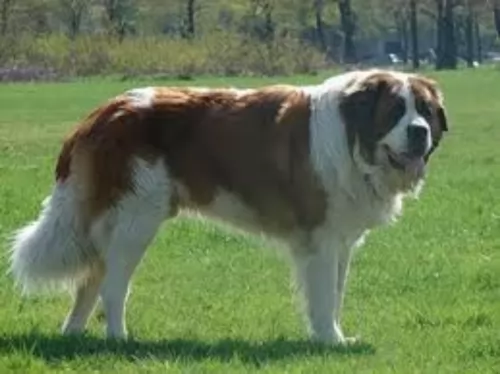 The Moscow Watchdog is a cross between the Caucasian Oytcharka, the St. Bernard and other Russian hound dogs. This large breed dog was developed in the Soviet Union for the purpose of being guard dogs. It had the awareness and assertiveness of the Oytcharka and the size, intelligence and attractiveness of the St. Bernard. The breed is common in Russia today but hardly seen anywhere else even though they were exported to the United States and Europe. The breed had the first U.S. born litter in 2015 and it is not AKC recognized.
The Moscow Watchdog is a cross between the Caucasian Oytcharka, the St. Bernard and other Russian hound dogs. This large breed dog was developed in the Soviet Union for the purpose of being guard dogs. It had the awareness and assertiveness of the Oytcharka and the size, intelligence and attractiveness of the St. Bernard. The breed is common in Russia today but hardly seen anywhere else even though they were exported to the United States and Europe. The breed had the first U.S. born litter in 2015 and it is not AKC recognized.
Following the second world war crime was on the rise in the Soviet Union and a new breed of dog was needed to counter this trend. The dog had to be adaptable to very cold temperatures, snowy weather and have a guard dog personality and ability. The breed was called on to guard such locations as railroads, government offices, warehouses, infrastructure and labor camps.
The project to develop this breed was led by General Medvedev beginning in 1946 at the Central School of Military Kynology – which was a department of the Soviet Ministry of Defense. It took many years to develop the Moscow Watchdog which then became a very successful breed.
It took until 1985 for the breed to be “officially” recognized in the Soviet Union and until 1992 to be recognized by the Federation of Dog Breeders in Russia and until 1997 for the standard to be approved by the Russian Kennel Club. They are still working with the FCI to gain international recognition for the breed. At the moment they are considered a part of the Molosser group and shown in the “Special Show” in Russia.
Committed breeders brought the Moscow Watchdog to Hungary in 1986 in order to make the breed more popular. In addition to this there were many breeders from previous Soviet States that wanted to preserve the breed as well. There were about 500 Moscow Watchdogs in Hungary around then. Currently there are about 27 Moscow Watchdogs in the United States. The breed is known to be a gentle giant and very much a family dog these days.
 The Finnish Spitz is balanced and symmetrical in body and females are longer than males. They have a very distinguishable prick, foxy ears and face. They have a smiling expression and a curved tail. They are a golden-red color with a double coat. The under coat is dense and soft While the top coat is stiff. Puppies often look like little red fox cubs. When born they are black, grey or brown with a lot of black. As an adult the pups grow up to be a mix of fawn and dark black. Lips, nose and rims of the eyes should be black.
The Finnish Spitz is balanced and symmetrical in body and females are longer than males. They have a very distinguishable prick, foxy ears and face. They have a smiling expression and a curved tail. They are a golden-red color with a double coat. The under coat is dense and soft While the top coat is stiff. Puppies often look like little red fox cubs. When born they are black, grey or brown with a lot of black. As an adult the pups grow up to be a mix of fawn and dark black. Lips, nose and rims of the eyes should be black.
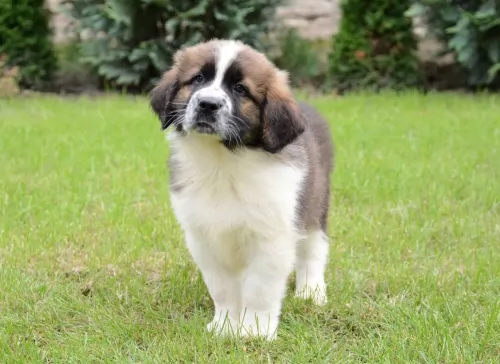 The Moscow Watchdog is related to the mountain dogs and is a very large breed. They are sturdy, muscular and powerful. They have big heads and a thick double coat that sheds profusely four times a year. They have a long tail, an arched chest and an air of confidence.
The Moscow Watchdog is related to the mountain dogs and is a very large breed. They are sturdy, muscular and powerful. They have big heads and a thick double coat that sheds profusely four times a year. They have a long tail, an arched chest and an air of confidence.
He is in the Mastiff family and is smart and trainable. He is not clumsy but has big bones. He is surprisingly agile and active for a dog his size. Unlike the St. Bernard he is not a couch potato. He is also differentiated from the St. Bernard because he does not drool.
These dogs are large but they’ve got a gentle temperament and are good with kids, being playful and energetic with them.
Even though he is a docile dog, you want him trained and socialized, and then he gets along well with other pets too. His sheer size makes it that it is best to supervise him when he’s around small children. He is also a protective dog breed, willing to bond closely to, and protect his human family.
 Very child friendly – loves to play with children as long as the children pay attention to them. If not, the Spitz will go elsewhere.
Very child friendly – loves to play with children as long as the children pay attention to them. If not, the Spitz will go elsewhere.
They are independent thinkers and close to family but not strangers. They often “yodel” instead of howl.
Needs to be with people, bonds deeply with his humans. Most get along well with other dogs but because of their hunting instinct they are not good with small pets or birds.
They are smart and learn easily. They are great athletes and learn games and competition well.
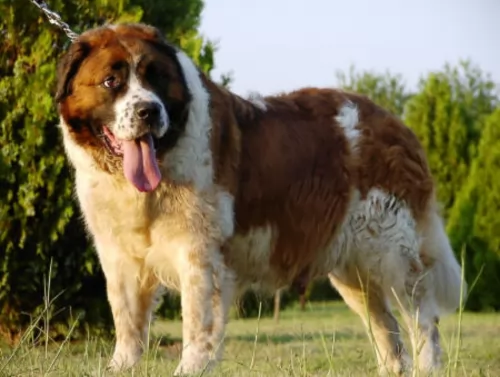 This is a large dog who likes to be involved and busy, even though he is so big. He isn’t suited to city life and being confined to a tiny garden as he needs space.
This is a large dog who likes to be involved and busy, even though he is so big. He isn’t suited to city life and being confined to a tiny garden as he needs space.
They’re independent dogs too and you can leave them alone during the day. He is social, so while you can leave them during the day while you’re at work, he’ll want your attention when you get back. They're such loving, loyal family pets that you owe it to him to make this gentle giant of a dog as happy as can be.
 Typically, a somewhat healthy breed, the Finnish Spitz does struggle with a few genetic concerns. They have been known to suffer from:
Typically, a somewhat healthy breed, the Finnish Spitz does struggle with a few genetic concerns. They have been known to suffer from:
 Moscow Watchdog is looked upon as a fairly healthy dog breed but there are some risks such as hip dysplasia as well as some other large breed problems.
Moscow Watchdog is looked upon as a fairly healthy dog breed but there are some risks such as hip dysplasia as well as some other large breed problems.
With big dogs like this, hip dysplasia is a threat. Its an hereditary condition where the parent dogs pass down the problematic genes. Hip dysplasia results in inflammation and pain for your pet, and where once he loved to play, he is reluctant to and battles to get up after lying down.
 Don’t overfeed the little guy. The Spitz had a good appetite for a dog its size and can gain weight quickly . Feed twice a day about 1/8th of a cup.
Don’t overfeed the little guy. The Spitz had a good appetite for a dog its size and can gain weight quickly . Feed twice a day about 1/8th of a cup.
The same advice hold for the adult dog. Feed 1/4th of a cub of high quality dry food twice a day.
When the Spitz is a puppy you should limit strenuous exercise and jumping. Don’t spay neuter at too young an age. Wait until they are mature at 3-5 years of age.
Again do not exercise vigorously at too young an age. When older the Finnish Spitz will need a yard to run in and exercise to satisfy his hunting instincts. A long walk every day is a must.
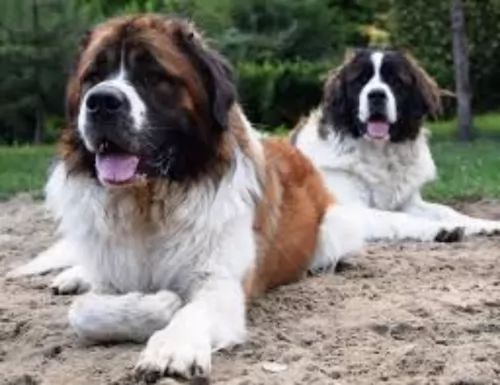 The Moscow Watchdog is a giant sized dog and will require a lot of regular exercise, and apart from a fairly brisk daily walk, will also need games and a run in the park.
The Moscow Watchdog is a giant sized dog and will require a lot of regular exercise, and apart from a fairly brisk daily walk, will also need games and a run in the park.
As a large dog requiring a regular dose of physical exercise as well as mental stimulation, he is better suited to life in the country or at least where there is a large garden.
The Moscow Watchdog has a medium length coat, and as a moderate shedder, you will need to simply brush his coat twice a week to remove loose hair. There is no professional grooming required for these dogs.
Homemade food is always a treat for a dog, but if you’re feeding your Moscow Watchdog commercially manufactured food because of the sheer convenience it provides, make sure the packaging says 'large- or giant dog breed' food. This way you know your pet is getting the right amount of minerals and vitamins for his size.
Always buy the best quality food to avoid giving your pet an overdose of colorants and preservatives. Try and give your pet some home-made food such as boiled chicken, some brown rice or pasta and some cooked vegetables such as sweet potatoes, carrots and spinach. These can be added to his kibble every now and again.
A simple diet like this agrees with your pet and he will be healthy and happy with his lot.